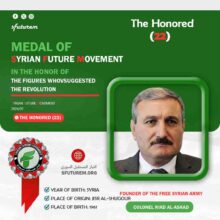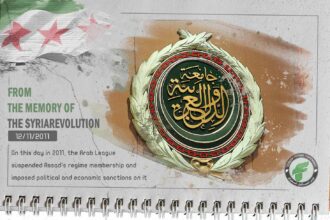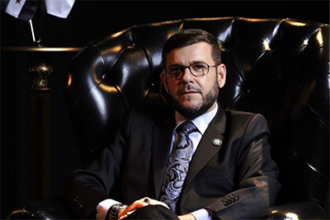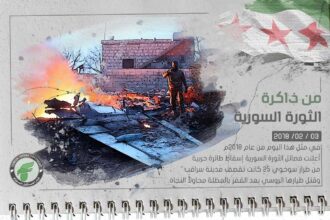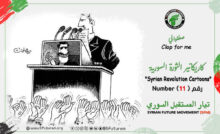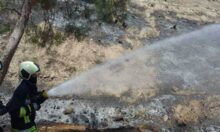Media OfficeSymbols and Figures of the State in Syria
Symbols and Leaders of the State in Syria (5) Ibrahim Hanano
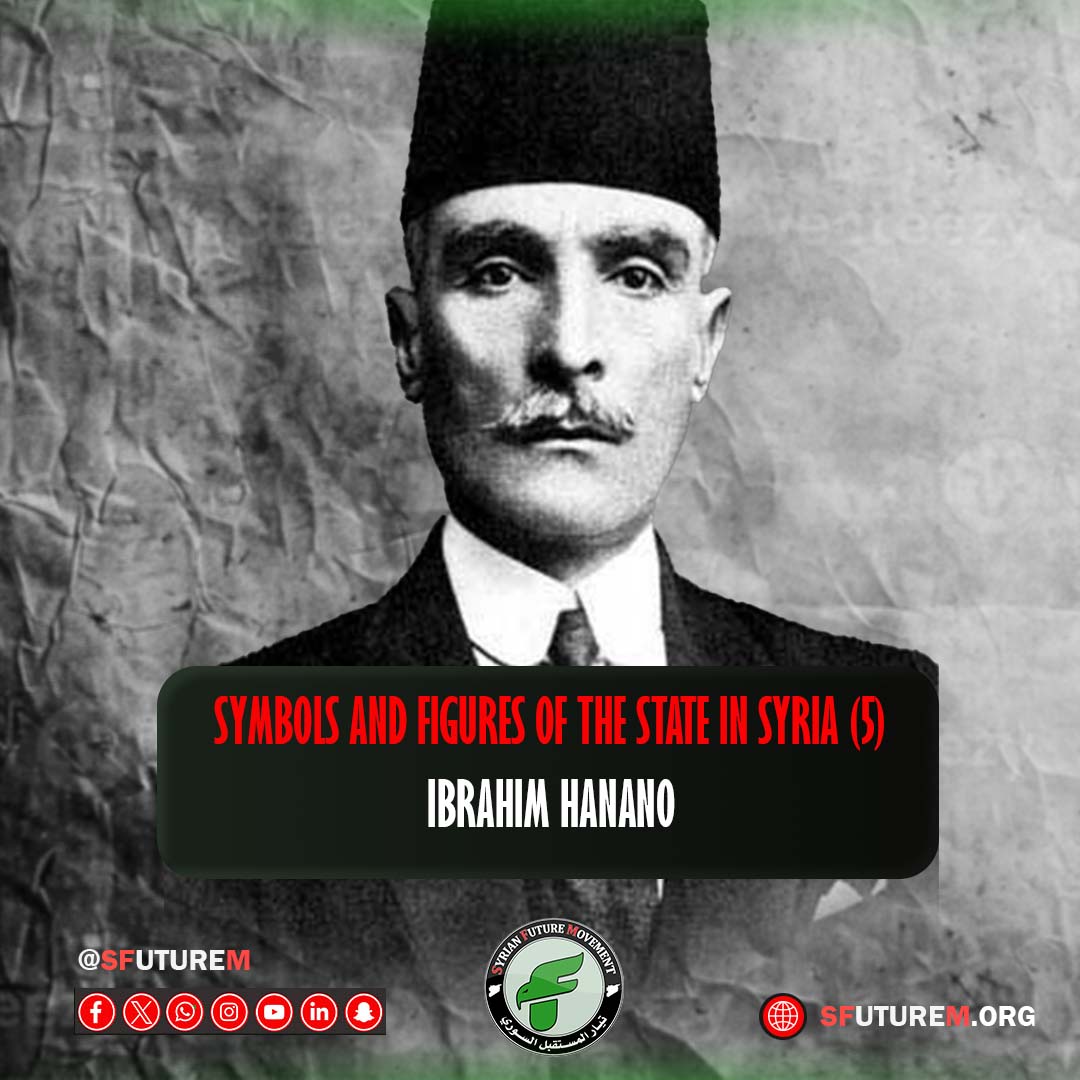
- “Ibrahim Hanano” Abu Tariq was born in Kafr Takharim in Idlib province.
- He grew up in a wealthy family; his father Sulaiman Agha was one of the wealthiest men in the city of Kafr Takharim, and his mother was the daughter of Hajj Ali al-Sirma, one of the city’s notables.
- He completed his primary education in Kafr Takharim and then moved to Aleppo, where he finished his secondary education.
- Ibrahim took four thousand gold liras from his father without his knowledge to study at the Sultanate University in Istanbul, returning home after four years.
- He left again for Istanbul to finish his law studies after another three years.
- While working in Istanbul, he married a girl from Erzurum, and they had a daughter named Nubahat. Twelve years after her birth, they had a son, Tariq, after whom he is nicknamed.
- His wife died fifteen days after the birth of their son Tariq.
- After completing his studies, he was appointed as a district director on the outskirts of Istanbul for three years and married there.
- After that period, he was appointed as a district governor in the regions of Erzurum where he stayed for four years.
- He was later appointed as an investigative judge in Kafr Takharim, where he remained for nearly three years.
- He was elected as a member of the Aleppo administrative council for four years.
- Subsequently, he was appointed as the head of the province’s diwan for two years, under Rashid Tali’at, the governor of Aleppo.
- He was elected as the representative of Aleppo in the Syrian General Congress in Damascus in the session of 1919-1920.
- After the Battle of Maysalun, the French divided northern Syria into five states (State of Damascus, State of Aleppo, State of the Alawites, Greater Lebanon State, State of Jabal Druze), and Subhi al-Hadidi was appointed as the president of the State of Aleppo instead of Hanano.
- A meeting was held at the end of 1919 at the house of Idlib’s district governor, Omar Zaki al-Afyuni, chaired by Hanano, to organize the affairs of the revolution. It was agreed to select him to form Arab forces in the form of bands of mujahideen to occupy the French who had occupied the city of Antakya, which was under the control of Azza Hanano, Ibrahim’s brother, who was forced to surrender the city based on the orders of the Arab government in Syria.
- Hanano collected his house’s furniture and burned it, declaring the start of the revolution and stating his famous phrase: “I want no furniture in a colonized country.”
- The first armed clash between the rebels and the French forces was on October 23, 1919, where the fighting lasted about seven hours.
- Hanano established a revolutionary court for anyone who dealt with France or insulted the revolution.
- Hanano’s fame spread, and his followers increased. Even his daughter demanded the heads of five French soldiers as her dowry.
- Prince Faisal signed the mandate treaty with France in 1920, which many Syrians rejected, and Hanano’s situation became difficult due to his desperate need for weapons and equipment.
- He had to rely on his friends in Turkey for help.
- He personally led twenty-seven battles against the French.
- In the battle of Sijri Farm, he managed to capture French soldiers and regained control of large areas from the French, including his birthplace, Kafr Takharim.
- Following this, the French entered Damascus and then Aleppo to suppress the revolution, and Hanano and his forces took refuge in Jabal al-Zawiya.
- Many joined him, allowing him to establish a military base, making the area his headquarters.
- His followers nicknamed him “Al-Mutawakkil Ala Allah” (the one who relies on God) because of his saying “We rely on God” whenever he went with his forces to raid the French.
- He moved his command area to Jabal Al-Arba’een, and his followers quickly increased after his victories over the French.
- Hanano declared the State of Aleppo and established an independent government under his administration.
- Negotiations began between him and the French, with Hanano demanding a halt to French troop movements as a condition for starting negotiations.
- Mustafa Kemal Atatürk signed an agreement with France and stopped his support for the Syrian rebels, weakening Hanano’s position in the negotiations.
- The French insisted that the state he demanded in the areas under his revolution (Idlib – Harem – Jisr ash Shugur – Antakya) be militarily restricted with the French, which Hanano refused.
- Han
ano was sentenced in absentia to four death sentences by the French military criminal court.
- With the French controlling the roads and the lack of military support, Hanano was forced to leave his strongholds to the south in 1921, where he tried to negotiate with Sharif Abdullah.
- On the way to Transjordan, he was ambushed near Jabal al-Sha’ar near Hama on July 16, 1921, in the battle of Maksar al-Husan, where he lost most of his companions.
- He managed to escape by himself, and his revolution was crushed.
- Hanano’s political aspirations were not suitable for Sharif Abdullah, and they did not meet, so Hanano continued his way to Jerusalem, where he was arrested by the British on August 13, 1921, and handed over to the French.
- He was brought before the French military criminal court on charges of breaching security and committing criminal acts, and the trial held its first session on March 15, 1922, under tight security measures.
- Fathallah al-Siqal, one of Aleppo’s prominent lawyers, defended Hanano, showing that the charges were false as Hanano was a political opponent, not a criminal, evidenced by the fact that the French had negotiated with him twice and signed a truce with him.
- From the stories of his historic trial, when the president of the military customary council said to Hanano: “The Syrian people did not ask you to declare the revolution!!” and without permission from the president, Saadallah al-Jabri stood up and said: “It was us who asked Leader Hanano to fight you, and we will not give up fighting you, as long as there is one patriot among us, until you leave our country.”
- On March 25, 1922, the French public prosecutor asked the court to execute him, saying, “If Hanano had seven heads, I would ask to cut them all off.”
- The French judge released Hanano, considering his revolution a legitimate political revolution, declaring the independence of the French judiciary from the military authority.
- After the trial and Hanano’s release, al-Siqal tried to bring Hanano to thank the president of the court for the acquittal, but the president refused to receive Hanano in his office, saying: “I do not shake hands with a man whose hands are stained with the blood of the French. When ruling, I was on the judicial platform, but now I am a French citizen.”
- Hanano took over the leadership of the national movement in northern Syria.
- In 1928, he was appointed as the chairman of the constitutional committee in the Constituent Assembly for drafting the Syrian constitution, but the French High Commissioner sought to disrupt the Constituent Assembly and the constitution, leading to demonstrations demanding the implementation of the constitutional provisions.
- In 1932, at the National Bloc conference, Ibrahim Hanano was elected as the leader of the National Bloc.
- In 1933, Hanano played a role in the resignation of Haqqi al-Azm’s government due to its intention to approve the French treaty.
- In September 1933, a person named Niyazi al-Kawsi shot at Hanano while he was in his village, but the bullet hit his leg, and al-Kawsi was arrested in Antakya and sentenced to ten years in prison, although the French High Commissioner issued a special pardon for al-Kawsi, leading everyone to believe in the French’s involvement in the assassination attempt.
- Due to his many movements between the mountains without shelter or protection from the weather, Hanano contracted tuberculosis, and his illness became chronic, leading to his death on Thursday, November 21, 1935.
- He was prayed over in the Umayyad Mosque in Aleppo.
- The first to report the news was his comrade and fellow fighter, Saadallah al-Jabri, who immediately announced his death to the men of the National Bloc, and to kings, princes, ministers, and prominent Arab figures. The muezzins in the mosques called to prayer, and the church bells rang, mourning the nation’s leader and fighter, Ibrahim Hanano.
- The great deceased was escorted to his final resting place on Saturday, November 14, in a grand funeral procession that the country had never seen before.
- Delegations from various Arab countries and Syrian provinces participated in the funeral.
- After the pure body was buried, orators and poets competed to eulogize the great deceased, among the speakers were Faris al-Khoury, Sabri al-Assali, Abdul Rahman al-Kayyali, and the poet Omar Abu Risha.
- The National Bloc then called for a large memorial service held in Damascus on January 10, 1936, at the Syrian University amphitheater, attended by delegations from various Arab countries, and speeches and telegrams from kings, princes, ministers, and national figures were read.
- Several popular songs and poems about him emerged, including a poem by the poet Badawi al-Jabal:
May God bless the grave encircled by it
Like the House of Mecca, visited by those who pilgrim and those who intend
Abu Tariq sleeps after insomnia with it
Leaving worries and calamities to those who remained vigilant
Dimmed by sickness, storms of truth, waves, and foam roared in his traits
If his griefs were stirred, he shook them off as the lion shakes off its chains
In his eyes flashed a wonderous lightning
And a world of singular magical genius - A popular song spread in Syria, sung by children:
A plane flew in the sky, with soldiers and light, Ibrahim Hanano was riding on his horse, oh France, you dog’s daughter, who told you to come to the war, when you saw Syria, you howled like a dog. - In every Syrian province, a main street is named after Ibrahim Hanano.
- On March 31, 2015, the al-Nusra Front destroyed the statue of Ibrahim Hanano in Idlib city.
We in the Syrian Future Movement, as we recall the memory of the state’s founding men in Syria, invoke one of the independence men, and one of the first symbols of the Syrian state, His Excellency the national leader, Al-Mutawakkil Ala Allah, Ibrahim Hanano, within a serial file we present to you to include symbols and flags of the Syrian state, wishing to link our contemporary revolutionary present with a solid past and historical milestones, hoping to revive in our people the need to build and create distinguished state men, to preserve the homeland, protect the gains, and restore the glory and honor of the Syrian state after years of injustice, tyranny, and corruption.
